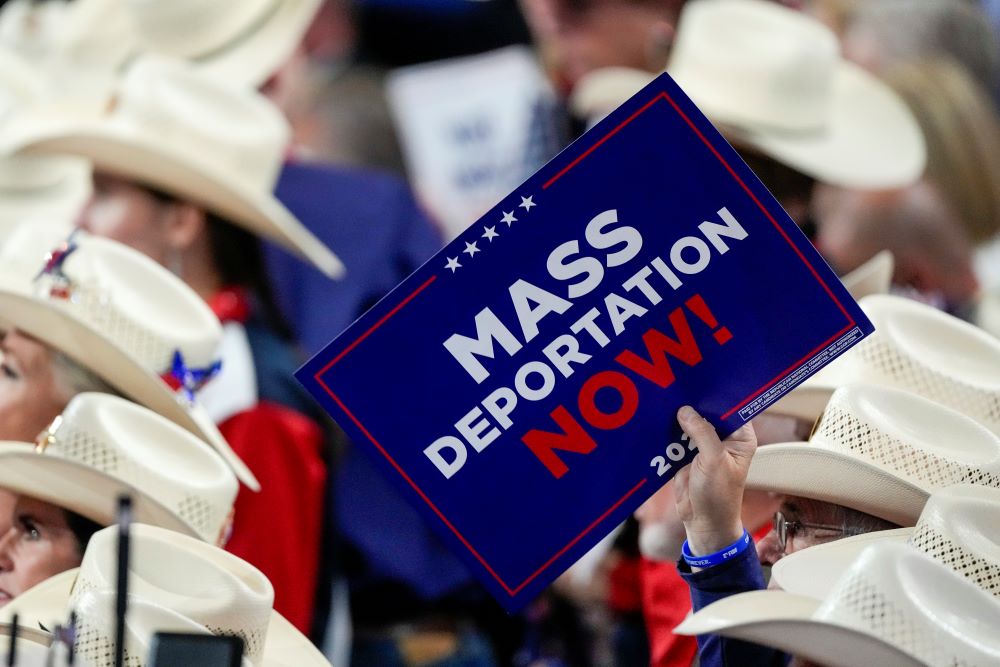
A member of the Texas delegation holds a sign during the Republican National Convention July 17 in Milwaukee. The GOP's position on immigration prompted ambivalent reactions from some Catholic Republicans at the convention, but many seem content with their party's harsh language on the issue. (AP/Matt Rourke)
Wisconsin billionaire Diane Hendricks took to the stage on the last night of the Republican National Convention to tell her rags-to-riches story that began with her growing up on a dairy farm and ended with her as one of America's richest self-made women.
"I was one of nine girls, no boys. I dreamed of moving to the city and wearing a blue suit," she said. "But at the age of 17, I became pregnant. That was not part of my plan. But I truly believe that every life is a sacred gift from God. And I give thanks every day for my son."
Hendricks' speech drew applause from the crowd, but it was one of only a few references — and not even a direct one — to an issue that had been essential and central to past GOP conventions and campaigns: abortion.
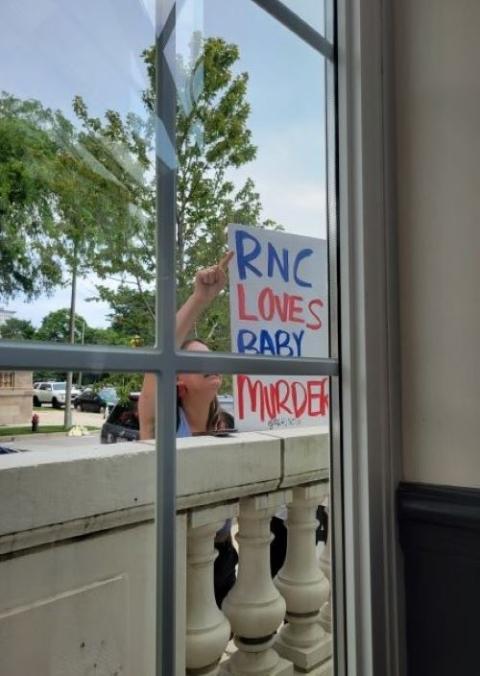
An anti-abortion protester holds up a sign outside a July 16 event sponsored by Georgetown University as part of the Republican National Convention in Milwaukee. (Heidi Schlumpf)
At their convention July 15-18, the Republicans thought it was enough to avoid the issue, which has been a drag on the GOP in the midterm elections and in polling. But with President Joe Biden dropping out of the race July 21, and Democrats rallying around Vice President Kamala Harris, issues having to do with women and reproductive rights are likely to become front and center.
Immigration — which may bring scrutiny to Harris, given her role on the issue in the Biden administration — prompted ambivalent reactions from some Catholic Republicans in Milwaukee, But many seem content with their party's harsh language about immigration. Advocating mass deportations is in notable contrast to statements from the U.S. bishops' conference, Pope Francis and other church leaders.
Delegates also seemed to accept the GOP’s softening on abortion. While neither party represents Catholic teaching on both issues, Catholic voters seem resigned to compromising in order to win.
"I'm not a single-issue voter," Gregory T. Angelo of Washington D.C., told NCR, after attending a Catholic prayer service on the last day of the Republican convention. He is president of an "anti-woke" watchdog organization and worked in the previous Trump administration.
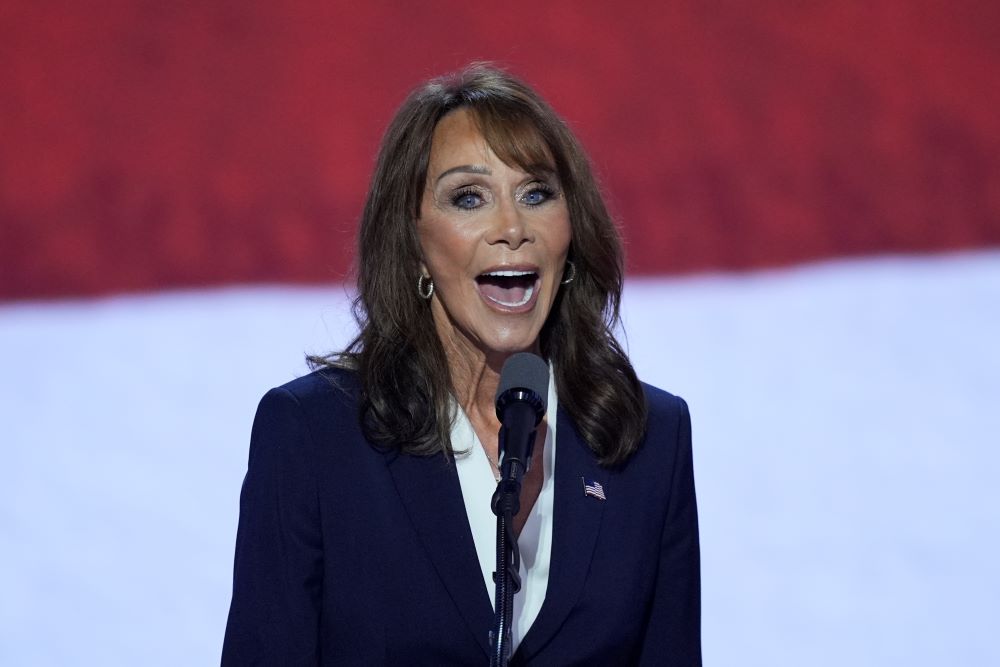
Wisconsin billionaire Diane Hendricks speaks on the final night of the Republican National Convention on July 18 in Milwaukee. In one of the convention's few references to abortion, she described her unplanned pregnancy at age 17. "I give thanks every day for my son," she said. (AP/J. Scott Applewhite)
Angelo agreed with the Republican strategy of instead focusing on issues that unite the party. On the issue of abortion, he hoped that God would change Americans' minds. "It's not the job of politicians necessarily to do that," he said.
Angelo also didn't see a problem with supporting "mass deportations" as a Catholic. "While I think we as a country, and we as Catholics, have a duty to be welcoming and merciful to anyone coming to the United States seeking aid and assistance, we also have an obligation to uphold the rule of law," he said.
Asked about the GOP's previous support of comprehensive reform that might make legal immigration more accessible, Angelo said he cynically wondered if that past position might have been Republicans' political posturing to attract the Latino vote.
"You'll notice how quickly Republicans have done an about-face since Trump showed them that you can be tough on borders and still have a winning coalition," he said.
Acceptance on abortion
The word "abortion" was not uttered once from the podium at the four-day GOP convention in Milwaukee, according to a New York Times analysis of 110,000 transcribed words of speeches. The phrase "born and unborn" appeared twice, and "pro-life" and "pro-choice" each appeared once. Neither Trump nor his vice presidential running mate, J.D. Vance (who is Catholic), mentioned abortion in their main convention speeches.
The rewritten GOP platform also softened its approach to the issue, removing language about a constitutional right to life and a national abortion ban and instead bumping the issue to the states, saying they are "free to pass laws" that restrict abortion. The platform does oppose "Late Term Abortion," but does not mention opposition to taxpayer-funding of the procedure. The platform supports access to birth control and IVF, both of which are opposed by Catholic teaching, though not by all in the pro-life movement.
Plenty of anti-abortion Republicans have expressed their disappointment with the GOP moves. "Is the Republican Party becoming pro-choice?" asked a headline in First Things magazine. A writer from the Ethics and Public Policy Center noted that "Pro-lifers helped bring Trump to power," then asked, "Why has he abandoned us?"
Yet on the convention floor and at prayer services and other places where NCR talked to religious delegates and voters, Republicans said they accepted the party's new approach to abortion, if grudgingly.
Advertisement
Sylvia Rowan, county clerk and chair of the Republican Committee in Herkimer County in upstate New York, said she is against abortion but was glad the GOP was not making it an issue.
"It seems to deter people's feelings on the election," the Catholic delegate told NCR. "I think the other side uses it as a weapon, because they know women are going to be upset and rightfully so."
Joe Neglia, a delegate from Tempe, Arizona, said he would prefer a platform with no allowance for legal abortion. "But we're not going to have a fight over it here. Trump has made his position clear," he said. "We disagree with it, but we accept it. He's the nominee and he gets to make the decisions."
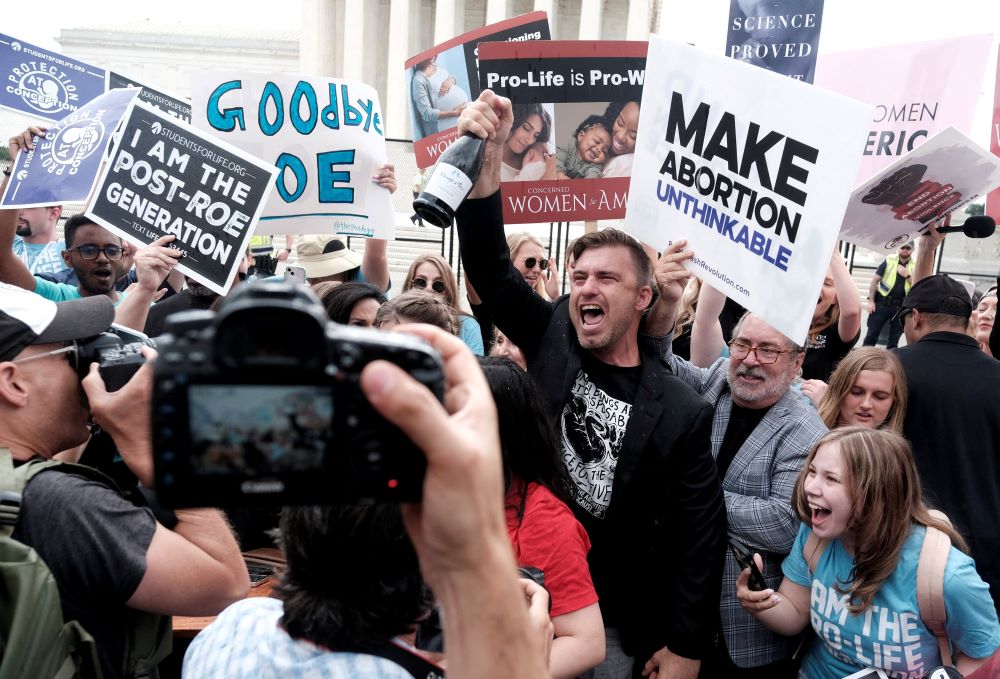
Pro-life demonstrators celebrate outside the U.S. Supreme Court in Washington June 24, 2022, as the court ruled in the Dobbs case, overturning the landmark Roe vs. Wade decision. The 2024 GOP party platform removes language about a constitutional right to life and a national abortion ban. (OSV News/Reuters/Michael A. McCoy)
Kristen Day, executive director of Democrats for Life of America, said she was not upset about the removal of a right-to-life plank in the GOP platform and called it "forward-thinking."
"Our take for a long time has been that this should not be a partisan issue," she told NCR after the convention. "Roe was overturned. Now we have to look at what's next."
Day sees the pro-life community now focused on ending abortion by supporting pregnant women, through legislation such as the child tax credit and through pregnancy help centers. Such centers are opposed by many Democrats who see them as manipulative and deceptive.
The Democratic Party, Day said, is "stuck in 1973," the year the Roe vs. Wade decision legalized abortion. "They're doubling down, not looking forward and going backwards. I think the Republican Party is moving in a direction that is more focused on the needs of women. The Democrats are going to be left behind."
Ambivalence about immigration
Jason Watts, a Catholic delegate from Allegan, Michigan, expressed concern not only about what he sees as "watering down" of the pro-life "north star" in the GOP platform, he's also concerned about the harsh language around immigration at the convention.
As someone who lives in an area where many migrants come to work the fields, he said, "It's not a question about securing our border but about having a sensible immigration policy."
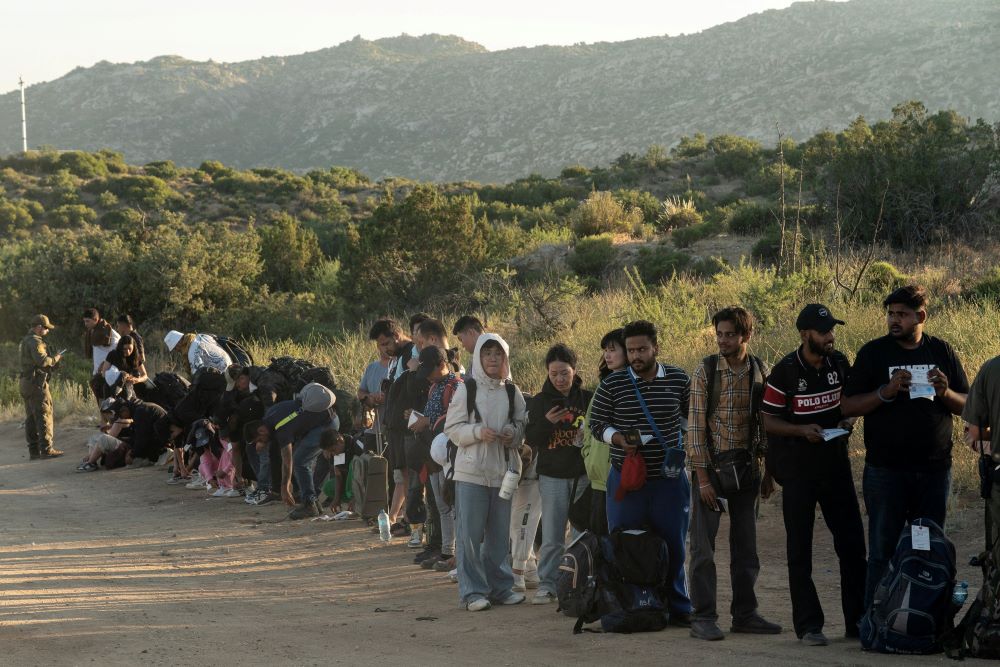
Asylum-seeking migrants stand in line to be transported at a staging area near the border wall, after U.S. President Joe Biden announced a sweeping border security enforcement effort, in Jacumba Hot Springs, California June 5. (OSV News/Reuters/Go Nakamura)
"Honestly, we need an immigration policy that can work for all. I'm not sure if this platform really addresses that," he told NCR.
Asked if his views were informed by his faith, Watts said: "My faith informs me to love my neighbor."
"I disagree with the premise of 'mass deportation,' " he said, "because it wasn't too long ago that we didn't think people would be put in mass cages, but it happened."
John, a delegate from Arkansas who declined to give his last name, said he lost an argument with his bishop on the issue of immigration. "Because how can we be anything but open with open arms?" he said.
But the Catholic delegate believes a border wall and limits on immigration are the most compassionate response — and that much of the strong rhetoric at the convention was only electioneering and unlikely to become policy.
"We just need to agree on a number and have legal and safe way for people to immigrate, so we don't have pregnant girls dying in the desert and little kids being separated from their moms and dads, and coyotes having people being pack mules as a way of paying their way across the desert," he said.
"The human suffering that's going on there is a great matter of faith and we need to step up for those people," he added. "But I think a border wall is a very Christian thing to have as a safe way for immigration."
'The relevance of the Catholic vote ends with Joe Biden. Religion is just not as culturally significant, and therefore not as politically significant, as it once was.'
—Steven P. Millies
Political scientist Steven P. Millies, director of the Bernardin Center at Catholic Theological Union, said it was "startling" that any Catholics agree with the idea of mass deportations. "Not only has Pope Francis been clear about this, but the U.S. bishops have been startlingly clear about this themselves. Immigration and justice for people in those vulnerable situations is probably the place they're closest to Francis."
Millies also sees Catholic acquiescence on GOP softening of abortion language as a "Faustian bargain" the pro-life movement has consistently made with the GOP. "The Republican Party is telling us that they're not serious about the life issues," he said. "This is a case of not having learned the lesson of 'Once bitten, twice shy.' "
Although the "Catholic vote" has long mirrored the larger electorate, Millies believes it will become more of a "Republican niche."
"The relevance of the Catholic vote ends with Joe Biden. Religion is just not as culturally significant, and therefore not as politically significant, as it once was," he said.
"Religious belief has become a cultural claim, a partisan claim, not having to do with any belief," he said. "It's just another way to 'otherize' people."
At the GOP convention, there was plenty of talk about religion, but relatively few explicitly religious events, and little organized Catholic presence.
At a sparsely attended Catholic prayer service on July 17, a few attendees gathered in a circle around Frank Pavone, the director of Priests for Life who was dismissed from the priesthood in 2022 for engaging in partisan political advocacy inconsistent with his role as a member of the Catholic clergy. Pavone led the Catholic services at the convention.
Among those attending was Victor Fusca, who shared his experience as a member of the crowd in Butler, Pennsylvania, where a would-be assassin shot at Trump. Fusca, who said he is Catholic, was standing in the bleachers behind Trump and is visible in many news photos from the day.
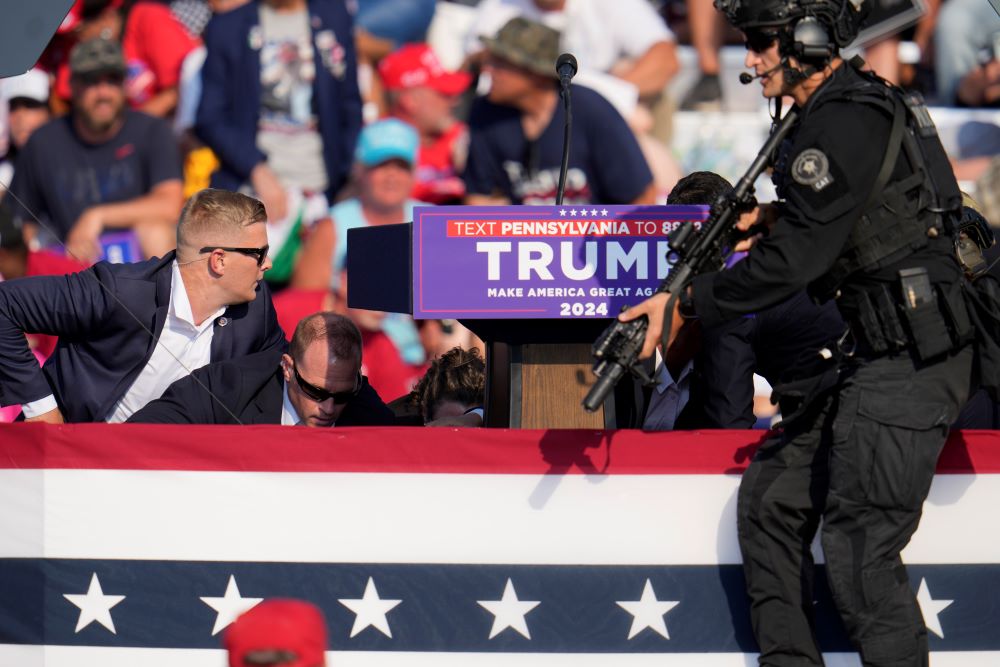
Republican presidential candidate former President Donald Trump is surrounded by U.S. Secret Service after an assassination attempt at a campaign event in Butler, Pennsylvania, on July 13. (AP/Gene J. Puskar)
When Trump dropped, Fusca "was totally convinced that our president was gone," he told the prayer service attendees. But when Secret Service personnel helped Trump up, "I knew he was going to be OK. … It was like a resurrection. It was like witnessing a miracle."
"Thanks for sharing," said Pavone, putting his arm around Fusca.
But at least one young delegate expressed concern about the party's religious language around Trump. Henry Walston, a student at Kansas State University who identifies himself as Christian, said he worried that the Republican Party "may be mixing our faith a little too much in the way we look at Trump."
"We seem to be looking more to Trump than Christ sometimes," he said, speaking over "God Bless the USA" blasting in the background near the food trucks. "Part of me appreciates all the prayers and everything that goes on at the RNC, but part of me worries that we're getting away from the core message when we do that.







